News from the Votemaster
Version 1.0 of the 2016 Republican Presidential Primaries
While the 2016 primaries are out there somewhere beyond Alpha Centauri, the potential candidates are already quietly gearing up, finding a third cousin once removed to visit in Iowa, attending the birthday party of a Republican county vice chair in South Carolina, and the like. The just-concluded 2014 CPAC annual conference near D.C. drew many of them, all of whom threw the obligatory large morsels of bright red meat to the assembled conservative masses. Who makes a credible presidential nominee in 2016? It is awfully hard to say and even harder to rank them, but we'll give it a try. Remember, a week is a long time in politics.
The modern Republican party has three dominant wings, and a successful candidate needs to convince at least two of them that he or she is their candidate. Very roughly, there is the business wing, composed of people who want lower taxes and less government interference in the economy. Above all, they want predictability. Many of these people are socially moderate and don't care much about the hot-button social issues. Next there are the evangelicals, who consider homosexuals to be sinners and abortionists to be murderers. They don't care much about the corporate tax rate. Finally, there is the tea party, which is nominally about lower taxes but in reality is against the modern world. It wants to go back to a different America, one which may or may not have existed for well-off white people living in small rural towns in the 19th century. There is a lot of anger and victimhood here. Sarah Palin is Victim-in-Chief.
Below is a first cut at a list of potential candidates, grouped in three tiers, from most likely to get the nomination to least likely. Various factors went into putting this list together: polls, name recognition, potential for raising $50 million next year, public image, etc. No doubt it will change radically as time goes on. Within each tier the candidates are listed alphabetically.
A page with the information below will be updated as circumstances change. A link to it can be found by clicking on the Data galore link in the menu to the left of the map above.
Tier 1 Candidates
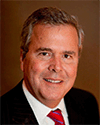 |
Jeb Bush. The business wing would love to see Jeb Bush run and would shower money on him, but Bush hasn't given any indication that he wants to run. He was a popular governor of Florida and would put that key swing state in the Republican column for sure. His wife, Columba, is a Mexican-American, and could be of great value peeling Latinos off from the Democratic party. His biggest minus is his name. Too many people remember his brother's presidency and another Bush-Clinton race would turn a lot of voters off. But if he really isn't interested in running, that's the end of it. |
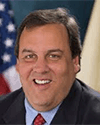 |
Chris Christie. The key word here is: Wisniewski. As in deputy speaker of the New Jersey state assembly, John S. Wisniewski, who is investigating whether Gov. Christie lied when he said he knew nothing about the lane closings on the George Washington Bridge until they hit the newspapers. If Wisniewski can dig up clear evidence that Christie either ordered or tolerated the lane closings and then lied about it, you can scratch him from this list. In fact, he'll probably be impeached and possibly indicted. If nothing more comes to light, Christie might survive intact. Wall Street loves him and would fight hard for him in 2016. His switch from pro-choice to pro-life may not be good enough for the evangelicals, however. They want somebody who is for real, not someone who has carefully calculated that there are more votes for position A than for position B. |
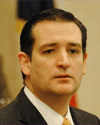 |
Ted Cruz. The tea party has a real crush on the guy but he is anathema to the business wing since they fear he would scare the daylights out of half the country. They really don't want 2016 to be a rerun of 1964, when Barry Goldwater made it abundantly clear he would rather be (far) right than President. Cruz was born in Alberta, Canada, and the question of whether he is even a U.S. citizen will come up in the primaries. The law is complicated, but Cruz is only a U.S. citizen if his mother met certain residency tests before he was born, which might be tricky to prove. Could the Republicans nominate someone as unelectable as Cruz? It's happened before (Goldwater, McGovern). Sometimes party activists are so wrapped up in their bubbles that they simple don't realize that their guy isn't all that popular outside the bubble, witness how many Republicans were really shocked by Romney's defeat, despite it being predicted months in advance here and numerous other places. The bottom line on Cruz is that he could well be the nominee but would go down in flames in the general election--and that might not bother some of his supporters. |
 |
Sarah Palin. Might she run? Well, Michele Bachmann ran in 2012 and Palin is better known and could raise much more money than any other candidate. Her big argument in the primaries that none of the other top-tier candidates have is that only she could prevent millions of moderate Republican and independent women from voting for Hillary Clinton. If anything, Palin is an even bigger bomb thrower than Cruz, but her supporters just love that. Unlike Cruz, who is a more-or-less traditional politician, albeit a very conservative one, with Palin anything could happen. She is without a doubt the most divisive figure in American politics but if she decides (on a whim) to run, she will spell big trouble for the Republican Party. |
 |
Rand Paul. He won the CPAC 2014 straw poll, but he also won it in 2010 and George Allen won it in 2006. Other previous winners include those famous Presidents Phil Gramm, Steve Forbes, and Gary Bauer, so its predictive value is kind of iffy. Paul represents a kind of libertarian view that is not popular in the modern Republican Party. For example, he thinks the states should decide if they want to allow same-sex marriage. This is heresy to the evangelicals. He also has no problem with states legalizing marijuana. Somewhat inconsistently, he is not in favor of letting states decide if abortion should be legal; he is against it. On foreign policy, he is an isolationist and is against using drones to kill people and against the NSA spying on Americans. He also thinks illegal aliens should be allowed to stay in the country but not be granted citizenship. His father, Ron Paul, ran for President multiple times on a similar libertarian platform and never got far, but his father is a cranky old geezer, which turned many people off. The son is more polished. Still, he is going to have to backtrack on many issues to placate the far right. Finally, when he was caught plagiarizing material for his speeches and writings, he acted defiantly, raising the question of whether he can take the heat of a national campaign. |
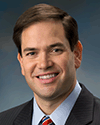 |
Marco Rubio. For a while, Rubio was the front runner. The pundits all said, wow, a young, handsome, articulate, Latino from the biggest swing state, what a package! Then Rubio tried to actually govern. Big mistake. He helped draft and pass the Senate's immigration reform bill, which died instantly upon reaching the House, but not before groups that want to see the 12 million people in the U.S. illegally either self deport or be deported began screaming at him. He tried backtracking, but he hasn't recovered yet. But 2016 is a long ways away and he could still recover. His pitch on the campaign trail could be: "The Republican Party must do something to attract Latinos or we are going the way of the Whigs. For example, nominate me." Also worth mentioning is that Rubio is a Cuban American and not all Latinos identify with that. |
Tier 2 Candidates
 |
Nikki Haley. If the ambitious governor of South Carolina gets reelected this year, she might make a run for it in 2016, more to enhance her Vice Presidential chances than in expectation of winning. Haley, born Nimrata Randhawa, is one of the two Indian-American governors (Bobby Jindal being the other one). Her pitch, like Palin's, would be "we have to prevent all the women from voting for Hillary." Being a minority would help in the general election but might prove to be more of a negative than a positive in the primaries. Another potential problem is that she was raised as a Sikh, although she now identifies as a Christian. Nevertheless, she attends both Sikh and Methodist services, which could prove to be a problem with evangelicals. An odd complication of her candidacy would be that all the other candidates would cede the normally important South Carolina primary to her and head down to Florida, which has a completely different ethnic mix than South Carolina. |
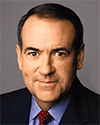 |
Mike Huckabee. Although Huckabee hasn't held public office for 7 years, he is still in the public eye (well, make that the public ear) due to his daily radio show, which he only recently ended. If he were to throw his hat in the ring, he would be aiming it at the evangelicals, since he is an ordained Baptist minister. His main competitor would be Rick Santorum, so Santorum's decision to run or not run could affect his. If Santorum declines to run, Huckabee could pick up much of the evangelical vote fairly easily. Some observers say that he ended his radio career to explore a run in 2016. His weakness is money. In all of 2008, when he came in second to John McCain, he raised only $16 million. He would need double or triple that to be viable in 2016 and it certainly isn't going to be coming from Wall Street, which tends to view him as a country hick. Still, if no other social conservative runs, Huck could catch fire again. |
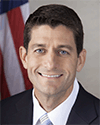 |
Paul Ryan. As the most recent Vice Presidential nominee, in principle Ryan should be a strong candidate. However, it is not clear at all if he intends to run. Some insiders say his goal is to become speaker of the House, when John Boehner can't take it any more. Ryan is also a wonky and cerebral guy, which might attract the votes of the Excel set, but evangelicals will never swoon over him. Furthermore, the Democrats are sure to make hay from budgets he has drawn up and which turn Medicare into a voucher program. That won't fly in retiree-rich Florida. A plus for him is that he has been through a national campaign and knows what it is all about. While only one President was elected directly from the House (James Garfield), Ryan is far better known than the average House member on account of his 2012 run. The big question mark remains whether he wants the job and is willing to devote 2 years of his life to try to get it, knowing what that entails. |
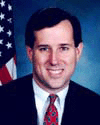 |
Rick Santorum. As the runner-up in the 2012, Santorum is potentially a serious candidate, even though he was crushed in his 2006 reelection bid for the Senate. His constituency in the 2012 primaries was the evangelical wing of the Republican Party, and that would be his base in 2016 as well (potentially split with Mike Huckabee, if Huckabee runs). Santorum is basically a one-trick pony: all he cares about are the social issues such as gays and abortion, but with a sizable chunk of the base, these are the key issues. In 2012 he ran as a total unknown and with little money. In 2016, he would be vastly better known and better funded. Of considerable importance is that billionaire Foster Friess, who kept Santorum afloat in 2012, has said that Santorum is his favorite candidate and would definitely help him in 2016 if he decides to run. |
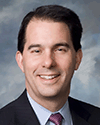 |
Scott Walker. The number of candidates who are acceptable to all factions of the Republican Party can be counted on one hand, without using the thumb and most of the fingers. Gov. Scott Walker (R-WI) is one of them. When he signed a bill greatly restricting collective bargaining for state employees, the unions forced him into a recall election, which he won. If he gets reelected in 2014, he will begin exploring a 2016 run. He recently signed a bill that would close two of Wisconsin's abortion clinics, so his anti-union and anti-abortion credentials are strong. He has two main problems. First, he is nationally unknown. In fact, he got only 7% of the vote at the 2014 CPAC conference straw poll so even conservative activists barely know him. Second, being great on paper doesn't mean you are ready for the major leagues (see Perry, Rick, 2012). |
Tier 3 Candidates
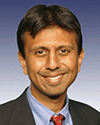 |
Bobby Jindal. All the pundits put Piyush "Bobby" Jindal on the list, but after his disastrous 2009 reply to President Obama's first speech to a joint session of Congress he took a nose dive. Also, in 2013 he said the Republicans had to "stop being the stupid party." Needless to say, if he enters the race, all of his opponents are going to jump all over this. Besides, if the Republicans want to nominate an Indian American (very unlikely), Nikki Haley also has the virtue (in a general election against Hillary Clinton) of being a woman. It will take a miracle for Jindal to be nominated but he probably doesn't know this (yet) and is likely to run. |
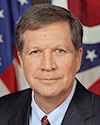 |
John Kasich. Gov. John Kasich (R-OH) is in the same category as Gov. Scott Walker (R-WI): a relatively unknown Midwestern governor that all factions of the Republican Party could unite around. Think of Kasich as Walker lite. He has been much less antagonistic to his opponents, which cuts both ways. It hurts him with the Democrats-are-the-spawn-of-the-devil crowd (who he needs in the primaries) but makes him more acceptable to independents in the general election. As an example of his governing style, he is one of the few Republican governors who opted for expanding Medicaid, and he did it against the express wishes of the state legislature which passed a bill prohibiting him for doing so. His primary opponents will accuse him of violating the Ohio constitution. Also, unlike Walker, who will probably sail to an easy reelection this year, Kasich is going to have to fight hard against Cuyahoga County Executive Ed FitzGerald (D) and Libertarian Party candidate Charlie Earl for reelection this year. We put him in Tier 3 because in the 2014 CPAC straw poll he was in a 7-way tie for 14th place with 1% of the vote. The natives are not exactly clamoring for his nomination. |
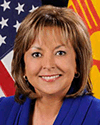 |
Susana Martinez. What about a very pretty Latina from a Western swing state? On paper, Gov. Susana Martinez (R-NM) looks great, but she has never dipped her toe in national politics. She says she is not interested in 2016, but that is what all governors say before the midterm election. Rumors had it that she was high on Mitt Romney's list of potential Veeps but that she actually refused, saying she had to take care of her ailing father (now deceased) and mentally and physically disabled sister, with whom she lives. Romney could have offered to pay for a squadron of registered nurses to take care of her relatives, but in 2016 she will be on her own. Still, as a much smarter and less abrasive version of Sarah Palin, with solid conservative credentials, she is a rising star. 2016 may or may not be her year though. |
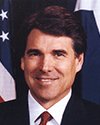 |
Rick Perry. Every list of 2016 potential candidates has to include 2012 laughingstock candidate Rick Perry. Maybe next time he will write on his palm the names of the cabinet departments he wants to abolish but it won't make any difference. With such a large field, virtually no one is going to prefer someone who now has the image of all hat, no cowboy. You can come back from a sex or financial scandal but not from a position where most of the country thinks you are the candidate of stupid. He might well run, but he has little to no chance. |
Hotly Contested Special Election in Florida Today to Fill GOP House Seat
When Bill Young (R) died in October, it set off a scramble for the House seat he had been sitting on for over 40 years. The seat is in FL-13, a swing district, but Young managed to win time after time due to his personal popularity. Both parties jumped into the special election with both feet. The Democrats picked Alex Sink, the state's former chief financial officer (treasurer) and unsuccessful 2010 gubernatorial candidate. The Republicans chose David Jolly, a lawyer who was Young's general counsel. Polls show the race is close, with Sink perhaps having a small edge.
The Affordable Care Act is the main campaign issue, with Sink supporting it and Jolly opposing it. The district, entirely in Pinellas County, around Sarasota on Florida's Gulf Coast, has one of the largest concentrations of retired people in the country and they are very attuned to anything involving health care. If Sink wins, the Democrats will say: "Campaigning on the ACA is a winner." The Republicans will say her win has nothing to do the ACA but Jolly lost due to the fact that he is recently divorced and is campaigning with his new girlfriend, who is 14 years his junior. If Jolly wins, the Republicans will say: "See, America hates Obamacare" and the Democrats will say Sink didn't run a good campaign. Over $9 million has already been spent on the race, which is extraordinary for a House race.
Update. Jolly won by 3400 votes, 48% to 47% with the rest going to a third-party candidate. Turnout was low: 182,000 people voted in the special election, compared to 330,000 in 2012. Low turnout always favors the Republicans as young people and minorities are the ones who only show up for presidential elections.
Email a link to a friend or share:---The Votemaster
Mar03 Ohio Eliminates Early Voting on Sundays
Mar03 Travis Childers to Run for the Senate in Mississippi
Feb26 Primary Season Begins Next Week
Feb08 Lt. Gov. John Walsh Appointed to Replace Baucus in the Senate
Feb03 Christie and 2016
Feb03 Update on the Key 2014 Senate Races
Dec19 Obama Names Max Baucus as Ambassador to China
Dec19 Democrats Sweep Virginia Statewide Offices
Nov23 The Senate Did Not Really Abolish the Filibuster
Nov06 Virginia is for Democrats
Nov06 Christie Wins Big in New Jersey
Nov06 The Establishment Strikes Back
Nov06 De Blasio Crushes Lhota in New York City
Nov06 Many Referendums on the Ballot
Nov05 All Eyes on Virginia and New Jersey
Nov05 Business Fights Back: Key Republican Primary to Be Held in Alabama Today
Nov05 Liberals Poised for Big Wins in New York City
Nov05 Key Ballot Measures Will Also Get Attention
Nov05 Bass Will Not Challenge Shaheen in New Hampshire
Oct17 Cory Booker Elected Senator from New Jersey
Oct17 Government Crisis Postponed for 3 Months
Oct01 The Blame Game Begins
Oct01 Primaries May Hurt Republicans' Senate Hopes
Sep19 Natalie Tennant To Run for Senate in West Virginia
Aug20 Ted Cruz Releases His Birth Certificate
Aug20 Lamar Alexander May Get Primary Challenger
Aug14 Booker on Track to Become Senator from New Jersey
Aug07 Kentucky and National Politics Get Intertwined
Jul23 Michelle Nunn Pre-Announces Senate Candidacy
Jul23 Liz Cheney to Challenge Sen. Enzi in Wyoming
Jul14 Schweitzer Won't Run for Baucus' Senate Seat
Jul14 Prospective Senate Candidate Sarah Palin Has Never Talked to State Republican Chairman
Jun26 Markey Holds Massachusetts Senate Seat for the Democrats
Jun26 Supreme Court Guts the Voting Right Act
Jun26 Is Ted Cruz Eligible to Be President?
Jun19 McConnell Threatens to Go Nuclear All the Time If He Becomes Majority Leader
Jun04 Lautenberg Dies, Christie on the Spot
Jun04 Rep. Carolyn McCarthy Has Lung Cancer
Jun04 Lautenberg Dies, Christie on the Spot
Jun02 Hagan Gets First Serious Republican Challenger
May19 Virginia Republicans Nominate Ken Cuccinelli for Governor
May19 Karen Handel Joins the Fray in Georgia
May04 Republicans Can't Find Senate Candidate in Iowa
Apr24 Sen. Baucus to Retire
Mar30 Republicans Gear Up for a Battle--with Themselves
Mar27 Sen. Tim Johnson Will Retire
Mar19 Head of the Republican Party Excoriates the Republican Party
Mar01 Latham Declines to Run for Harkin's Senate Seat in Iowa
Feb15 Democrats Avoid Bruising Senatorial Primary in New Jersey



